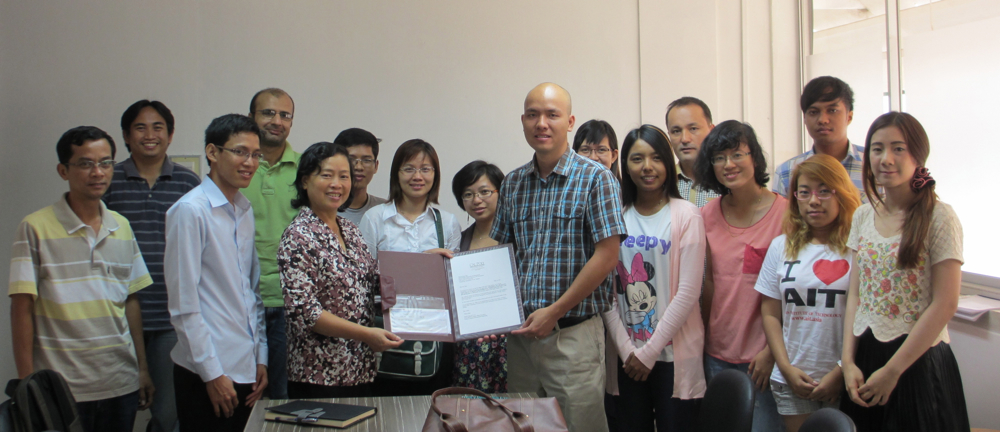
Mr. Nguyen Hong Phuc
households are linked to persistent cough, phlegm, breathlessness and
wheezing, and to cardiovascular diseases and lung cancer. Studies also
indicate that the pollutants are one of the four greatest factors
causing death in developing countries, and are linked to 1.6 million
deaths annually, primarily to women and children.According to scientists, the inefficient indoor stoves also consume
more fuel and generate higher emissions than the energy they produce.
Moreover, the indoor air pollutants eventually escape outside and
contribute to worsening regional and global climate change.AIT environmental engineering and management (EEM) graduate student
Mr. Nguyen Hong Phuc, therefore, decided to research this monumental
problem by assessing the situation in the Red River region of his
native Vietnam.
Recently, in May this year, a paper he co-authored based on his larger
AIT Master’s thesis earned the 28-year-old Hanoi native a Best Master’s
Student paper award from the West Coast Section – Air and Waste
Management Association based in the United States.
For the former lecturer at Hanoi University of Science, it was his
first international recognition. But Phuc is actually the latest
award-winner from the air quality research group of EEM; a field of
study accustomed to seeing its students crop competitive honors.
In his winning paper “Assessment of Air Quality and Climate Co-benefit
for Residential Combustion Sector in the red River Delta, Vietnam,”
written along with his advisor Dr. Nguyen Thi Kim Oanh, Phuc evaluated
air quality and climate co-benefits possible for rural areas under
different fuel-usage scenarios.
Vietnam’s population is 70 percent rural. It is estimated that about a
third of Vietnam’s energy consumption is from traditional biomass and
waste, and nearly 60 percent of the biomass is consumed by households,
mainly in the countryside.
Based on his research conducted in 2011, Phuc found evidence that
reducing indoor air pollutants led to the “win-win” result of increased
air quality at local levels and decreased emissions of greenhouses
gases at the global scale.
This finding was achieved through a device set up to monitor how much
carbon dioxide equivalent could be reduced in the defined rural
locality, and through a survey, he said.
“By studying one common area in the Red River region, I was able to
identify what kind of fuel or mix of fuels is the most environmentally
suitable,” Phuc said. “I propose a combination of rice-straw and
liquefied petroleum gas as the best option.”
Phuc was enrolled as a Master's student at AIT under the DAAD-AIT
scholarship in August 2010, and he graduated in May 2012. He is
now working on his doctorate at AIT made possible through financial
support from the Government of Norway. He says he intends to continue
along a research path laid by his earlier work. “My final destination
is to understand the impact air pollution has on human health through
objective quantitative analysis.”

Dr. Nguyen Thi Kim Oanh
presents the Air & Waste Management Association (AWMA) award to Mr.
Nguyen Hong Phuc at AIT as students from the air quality research group
of EEM look on.
